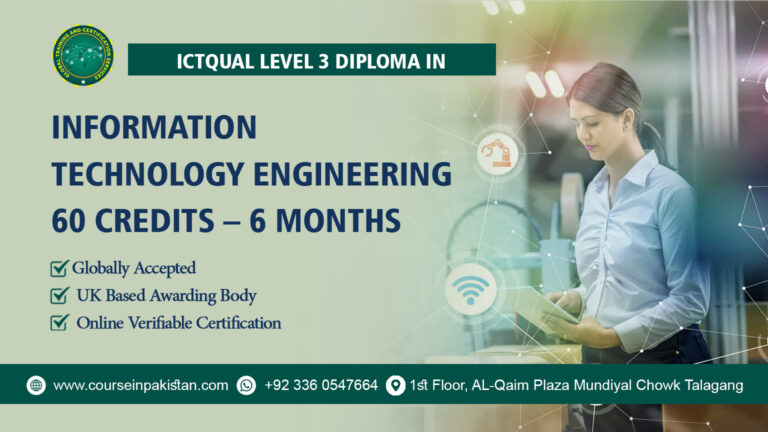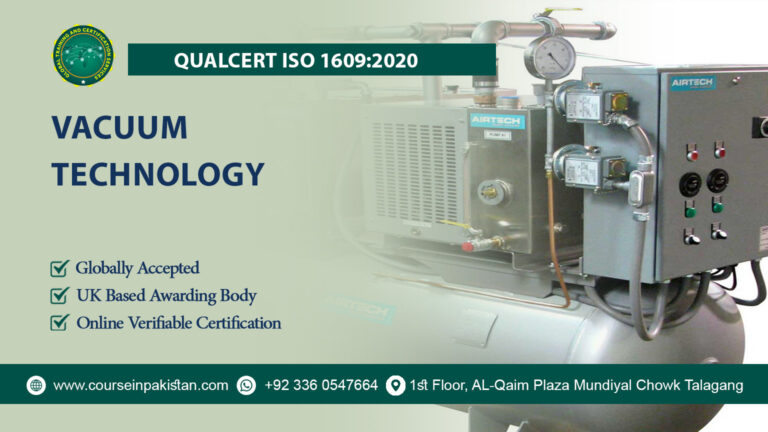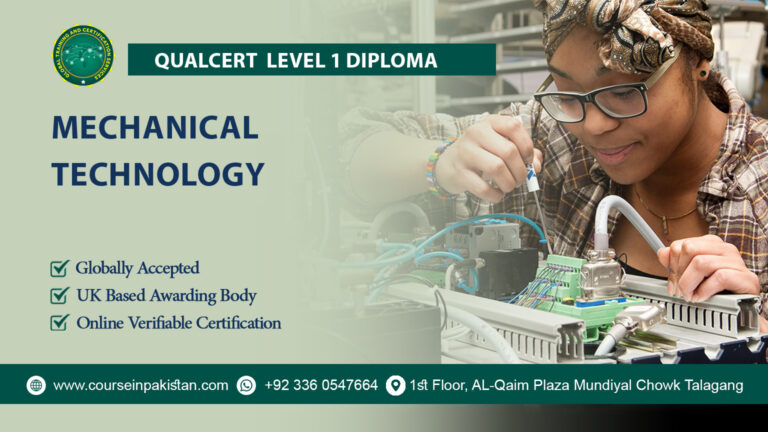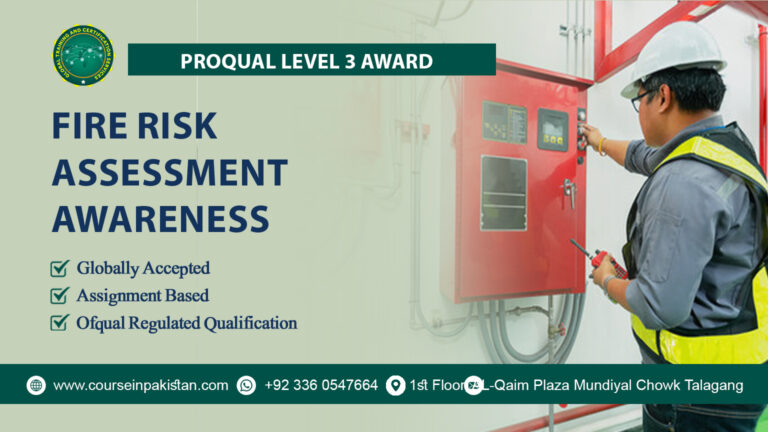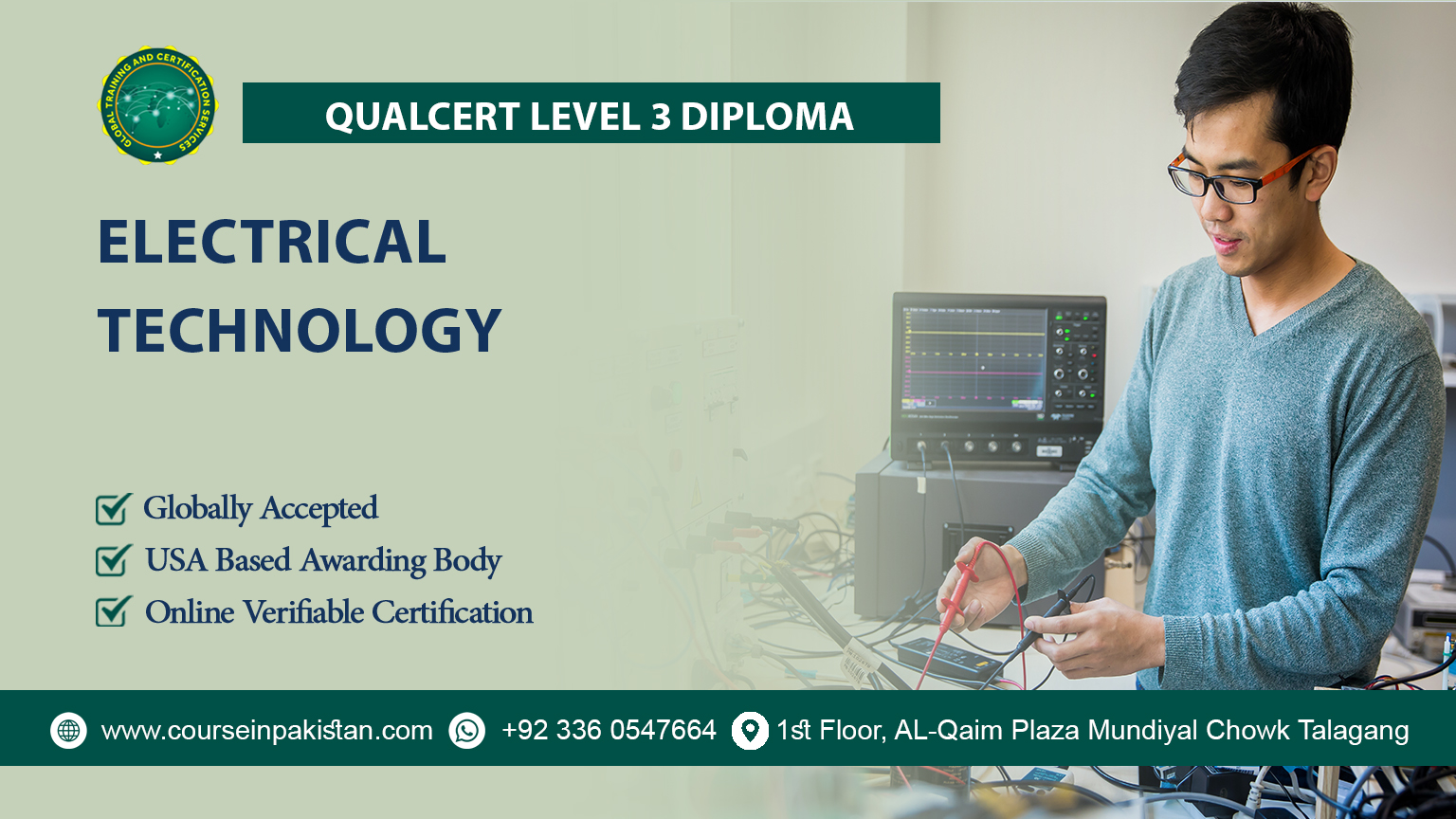
The QualCert Level 3 Diploma in Electrical Technology is a comprehensive qualification designed to equip you with the essential skills, knowledge, and expertise needed to excel in the electrical industry. Whether you’re looking to advance your career or kick-start a new one, this course provides you with practical, industry-relevant knowledge, making you a highly sought-after professional in the field of electrical technology.
This course focuses on a wide range of electrical systems, installations, and maintenance processes, providing you with hands-on training and theoretical knowledge to meet the demands of today’s fast-evolving industry. Upon completion, you will be ready to work in a variety of electrical roles, from installation and maintenance to design and repair.
Course Overview:
The QualCert Level 3 Diploma in Electrical Technology course offers an in-depth exploration of electrical systems, circuits, and technology. The course is ideal for those seeking to advance their electrical skills, learn to design electrical systems, or prepare for a career in electrical installation and maintenance.
Throughout the program, you’ll study various electrical concepts, including wiring regulations, fault finding, and installation practices. The curriculum is designed to provide both practical experience and theoretical knowledge, ensuring you can apply what you learn in real-world scenarios. You’ll gain the skills needed to work with industrial, commercial, and residential electrical systems.
Key Features of the Course:
- Hands-on practical experience in electrical systems and technologies
- In-depth coverage of current electrical standards and regulations
- Opportunity to specialize in electrical installation or maintenance
- Certification recognized by industry professionals
Course Benefits:
Completing the QualCert Level 3 Diploma in Electrical Technology offers a wealth of benefits that will help propel your career in the electrical sector:
- Industry-Relevant Skills: Gain practical knowledge and technical skills in electrical technology that are highly sought after in the job market.
- Comprehensive Knowledge: Learn about advanced electrical systems, circuit design, installation, and maintenance processes, preparing you for a wide range of roles.
- Hands-On Experience: Apply what you’ve learned in real-world scenarios with practical workshops, making you job-ready from day one.
- Global Recognition: The qualification is globally recognized, allowing you to pursue career opportunities both locally and internationally.
- Career Advancement: Open doors to new roles, promotions, or the opportunity to start your own electrical business.
- Confidence in Compliance: Gain an in-depth understanding of the latest wiring regulations and safety standards, ensuring you meet industry compliance requirements.
Course Study Units:
- Introduction to Electrical Principles
- Electrical Circuit Analysis
- Electrical Components and Devices
- Electrical Installation Practices
- Electrical Power Systems
- Electrical Machines and Transformers
- Control Systems and Automation
- Renewable Energy Technologies
- Electrical Safety and Regulations
- Emerging Technologies in Electrical Engineering
Course Learning Outcomes:
1: Introduction to Electrical Principles
- Understand the key electrical terminology and measurement units.
- Explore the fundamental principles of electricity, including voltage, current, and resistance.
- Apply Ohm’s Law to analyze and solve electrical circuit problems.
- Differentiate between series and parallel circuits, and understand their applications.
2: Electrical Circuit Analysis
- Use Kirchhoff’s Laws to analyze and solve complex electrical circuits.
- Simplify circuits using Thevenin’s and Norton’s Theorems.
- Perform mesh and nodal analysis to solve intricate circuits.
- Study the transient response of circuits containing capacitors and inductors.
3: Electrical Components and Devices
- Identify key electrical components such as resistors, capacitors, and inductors.
- Understand the properties and applications of semiconductors and diodes.
- Explore the functionality and uses of transistors in modern electronics.
- Learn about integrated circuits (ICs) and digital logic fundamentals.
4: Electrical Installation Practices
- Interpret electrical wiring regulations and industry standards for installations.
- Recognize various types of electrical wiring systems and their applications.
- Demonstrate safe electrical installation practices for residential and commercial settings.
- Implement earthing and bonding requirements to ensure safe electrical installations.
5: Electrical Power Systems
- Describe how electrical power is generated and distributed.
- Understand the process of transmitting and distributing electrical power to consumers.
- Learn the differences between single-phase and three-phase power systems.
- Grasp the significance of power factor correction and its impact on system efficiency.
6: Electrical Machines and Transformers
- Explore the working principles of electric motors and generators.
- Differentiate between DC and AC motors, and their applications in various industries.
- Understand transformer theory and their role in voltage regulation and power distribution.
- Analyze the efficiency and power factor considerations in electrical machines.
7: Control Systems and Automation
- Understand the fundamentals of control systems, including open-loop and closed-loop systems.
- Identify the key components in control systems, such as sensors and actuators.
- Learn to program and operate Programmable Logic Controllers (PLCs).
- Discuss applications of industrial automation and robotics in modern control systems.
8: Renewable Energy Technologies
- Gain an overview of renewable energy sources, including solar, wind, hydro, and biomass.
- Explore the components and working principles of photovoltaic systems.
- Study wind turbine technology and its integration with the electrical grid.
- Understand energy storage solutions, such as batteries and fuel cells, for sustainable power.
9: Electrical Safety and Regulations
- Emphasize the importance of electrical safety in the workplace and everyday applications.
- Interpret national and international legislation and regulations governing electrical work.
- Identify and correctly use personal protective equipment (PPE) to ensure safety during electrical work.
- Conduct risk assessments and develop strategies to mitigate electrical hazards.
10: Emerging Technologies in Electrical Engineering
- Understand the role of smart grids in modern power systems and their benefits.
- Identify the potential applications of the Internet of Things (IoT) in electrical engineering.
- Explore energy-efficient technologies and sustainable practices in electrical design.
- Discuss upcoming trends and innovations shaping the future of electrical technology.
Who is This Course For?
The QualCert Level 3 Diploma in Electrical Technology is ideal for:
- Aspiring Electricians: Individuals looking to begin or progress in their electrical career, whether in residential, commercial, or industrial sectors.
- Current Electrical Technicians: Professionals wanting to expand their knowledge and skills, or upgrade their qualifications to meet industry demands.
- Electricians Seeking Specialization: Those looking to specialize in specific areas of electrical technology, including design, fault finding, or maintenance.
- Tradespeople and DIY Enthusiasts: People with a basic understanding of electrical work who want to deepen their knowledge and skills for personal or professional projects.
Future Progression:
After completing the QualCert Level 3 Diploma in Electrical Technology, you’ll be well-positioned to pursue the following career paths:
- Fully Qualified Electrician: Gain employment as a qualified electrician in residential, commercial, or industrial sectors.
- Electrical Designer: Design electrical systems for new constructions or renovation projects.
- Maintenance Technician: Specialize in maintaining and servicing electrical equipment for industrial and commercial clients.
- Electrical Contractor: Start your own electrical business and manage your projects, team, and clients.
- Further Education: Pursue advanced qualifications in electrical engineering or other related disciplines, such as the NVQ Level 3 in Electrical Installation.
The QualCert Level 3 Diploma in Electrical Technology offers the perfect blend of theory and hands-on experience, ensuring that you gain the skills required to thrive in the electrical industry. With globally recognized certification and extensive career opportunities, this course is the ideal choice for anyone looking to advance or begin their career in electrical technology.

